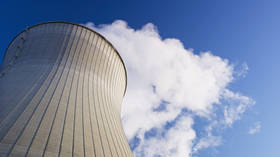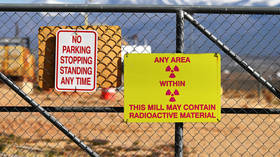Moscow plays down US ban on Russian uranium

Washington’s ban on imports of enriched uranium from Russia will have no ‘critical’ effect on the country’s nuclear industry, Kremlin spokesman Dmitry Peskov said on Tuesday.
US President Joe Biden signed a bill into law on Monday, banning the importation of Russian nuclear reactor fuel, with the legislation set to come into effect in 90 days.
According to Peskov, the US has resorted to banning uranium imports due to its inability to compete with Russia’s nuclear industry, which is “one of the most advanced in the world.”
“It is not critical for the Russian nuclear industry. It is difficult for Americans to compete with us on the international stage. And when it becomes difficult for them to compete, they tend to go to any lengths, including measures that corrode, distort and smash all the norms and principles of international trade,” he stated.
This is nothing more than unscrupulous competition and a continuation of the undisguised course the Americans have taken.
Peskov described Russia’s nuclear industry as “extremely competitive,” and said it would continue to develop despite sanctions.
As of 2022, Russia was the largest enriched uranium exporter on the global market, accounting for roughly 35% of the fuel sales worldwide with an estimated export value of $2 billion, according to Rosatom annual report.
The precise value of Russian enriched uranium exports in 2023 is more difficult to ascertain as neither Russia nor the bulk of its global buyers have made data publicly available. However, according to a recent report by the UK-based Royal United Services Institute (RUSI) based on a range of sources, Russian exports last year reached $2.7 billion.
Russia provided almost a quarter of the enriched uranium that fueled US commercial nuclear reactors in 2022, making it America’s top foreign supplier of the fuel that year, according to the US Energy Information Administration.
Commenting on the ban, Russian Ambassador to Washington Anatoly Antonov warned that it could backfire on the US economy. America’s current domestic enrichment capacity can supply only 30% of the fuel required by its commercial reactors, according to a US House report. To offset risks, the new legislation allows the US Department of Energy to issue waivers for Russian uranium purchases in the event of supply concerns until 2028. The bill also provides $2.7 billion in federal funding aimed at building new enrichment capacity.
Experts previously warned that the ban on Russian nuclear fuel could cause a spike in global prices. Jonathan Hinze, the president of nuclear fuel market research firm UxC, told Bloomberg last month that the ban could see enriched uranium prices go up by as much as 20%.













